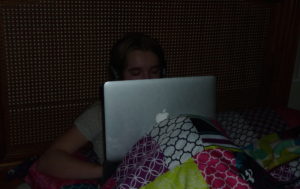Welcome to all the new parents who have recently joined the Toddler to Teen™ Parenting Solutions Community and thank you for all the wonderful comments and emails about the three part video series and webinar.
We now resume with our regular schedule, weekly thought-provoking parenting blogs, to start your Sunday off with some ideas to ponder…
Today I’m writing about a phenomenon that affects our children, our teens, and ourselves….sleep and screens!
I’ve noticed in my practice, that more and more parents seem to be giving their children Melatonin to help them sleep at night. I am not a doctor and so I’m not going to comment on medical treatment, but I do wonder about the connection of screens and one’s ability to fall asleep…
Dr. Daniel Siegel, a child neuropsychiatrist, and author of many wonderful books, states the following serious concerns regarding sleep:
- We need sufficient sleep to allow active neurons to rest (Dr. Daniel Siegel recommends 7-9 hrs. for adults, elementary age children need at least 10 hrs. and teens need at least 9 hrs.)
- We need enough sleep to allow the supportive cells, the glial cells, to clean up the toxins that neurons produce
- Sleep deprivation decreases attention and focus
- Sleep deprivation impairs memory
- Lack of sleep hampers the problem-solving process
- With less sleep, insulin, which regulates our metabolism, works in the opposite way and makes us gain weight and eat more
Dr. Mark Rosekind (PhD) adds:
- Technology/screens affect our cognitive stimulation and rev up the neurons in the brain which start to race (the opposite of what we want to happen at bedtime)
- The physical act of responding to a video game, a text message, or an email can create physical tension, which can trigger our “fight” or “flight” response and lead to cortisol, the stress hormone being produced (again, the opposite of what we want to happen at bedtime)
- The light rays from screens pass through our retina into the part of the hypothalamus which delays the production of melatonin – the sleep inducing hormone
- Consistent sleep deprivation readjusts one’s “internal clock” and then it’s really challenging to fall asleep on time
Dr. Brian Zoltowski says:
- Our eyes perceive a range of wave lengths from different kinds of light, which produce different colour sensations – these sensations help to “tune” our “internal clock”
- The smart phones, iPods, tablets and computer screens all produce blue light, which in nature, is produced the most, in the morning – the blue light tells us to rise and get active! (not what we want at bedtime!)
- In nature, red light is more common in the evening and slows us down
What Can We Do to Be Proactive about Screens and Get A Good Night’s Sleep?
Dr. Natalie Dautovich recommends:
- Black out curtains (if you have lights outside)
- A cooler bedroom (60-67 degrees) as our body temperature cools as it prepares for sleep (*Note: This is why a hot bath is not a good idea right before bed)
- Use an alarm clock that doesn’t emit light (vs. a smart phone for your alarm)
- No screens in the bedroom (a television at a distance is not as bad as an iPod, tablet, computer or smart phone up close, but it is still not recommended)
- Spray lavender for calming effects (can be sprayed on your pillow case)
- Keep your bedroom clean and uncluttered – a peaceful sanctuary
All of these professors and researchers recommend a “screen-time curfew” that happens at least one hour before actual bedtime!
Many behavioural problems are associated with sleep deprivation. Many attention, focus and memory problems are also associated with too little sleep.
We spend approximately one third of our lives sleeping, thus it should be a number one priority!
Take-action tip for this week: Create a “screen-time curfew” for all members of the family!
Happy restful screen-free sleeping,
Warmly,

PS. Both of my upcoming self-empowerment groups are now full – the next round will begin again in November 2016. Registration is open for my next round of “Brain Science” groups – Understanding Anxiety and Anxiety Management Strategies. The 7-9 year old group is full but there are still two spaces available in the 10-12 yrs. group. The group runs for 7 Thursdays and will begin on May 12th, 2016. (I will also be running summer anxiety management groups – dates coming very soon). For more information for the spring group and to register online, please click here.
PPS. If this article could benefit a friend or family member, please share it with them
PPPS. If you enjoyed this article and would like to express your “like”, please click here ~ thank you, I really appreciate it!
Want to Connect?
Subscribe now to receive free weekly parenting tips and inspiration.







